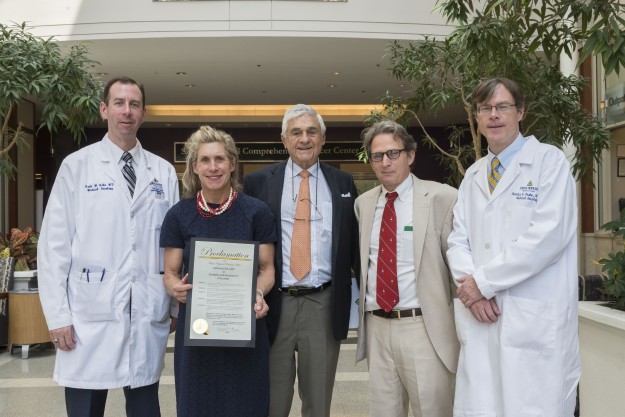***This blog is the third in a three-part series on bladder cancer. Read parts one and two.
The Johns Hopkins Greenberg Bladder Cancer Institute held its first public symposium with three leading bladder cancer experts providing novel new approaches to managing bladder cancer.
“This institute, solely focused on bladder cancer, is the first one of its kind in the world engaged in clinical and laboratory research singularly aimed at finding better ways to diagnose and treat bladder cancer and ultimately find a cure,” said William Isaacs, Ph.D., interim director of the institute. “The institute leverages all of the expertise throughout Johns Hopkins and the Kimmel Cancer Center to transform the treatment of bladder cancer.”
The symposium was attended by Erwin and Stephanie Greenberg, who helped establish the institute with a $15 million gift, Ronald Peterson, President of The Johns Hopkins Hospital and Health System, Diane Zipursky Quale, Director and President of the Bladder Cancer Advocacy Network, Leana Wen, Baltimore City Health Commissioner, Johns Hopkins bladder cancer experts, patients, and families. Wen presented Peterson with a proclamation of “Bladder Cancer Awareness Day” in recognition of the Greenberg’s generosity and the important work it has facilitated at Johns Hopkins.
“Tens of thousands of people are diagnosed each year, and this is far too important for us to ignore any longer. That’s why we’re here today,” said Wen. “What an extraordinary group. All of you—patient advocates, patient and family members, researchers, nurses, doctors, and other caregivers—make me understand what patient and family centered care means. “
The highlight of the event was the presentation of laboratory and clinical advances by three Greenberg Bladder Cancer Institute-funded scientists “These three are internationally renowned experts and they form the heart of the bladder cancer institute,” said Isaacs.
Trinity Bivalacqua, M.D., Ph.D. – Nanoparticles and Re-engineered Urinary Tract
A Greenberg Bladder Cancer Institute-developed therapy uses nanoparticles to deliver chemotherapy beyond the superficial lining to penetrate deep muscle where cancer cells can hide. Studies in patients using this form of novel chemotherapy administered directly into the bladder are planned.
Another unique clinical trial used tissue engineering to restore and make a complete urinary system after radical cystectomy, using the patient’s own tissue—smooth muscle cells on a biologic scaffold. Implantation of the neo-urinary conduit resulted in regeneration of all layers of the urinary tract, including new nerve fibers The trial provided proof-of-principle of the ability to make urinary tissue, however there is much work to be done to achieve Bivalacqua’s ultimate goal of developing a urinary conduit and bladder made out of patients’ own cells.
Charles Drake, M.D., Ph.D., and Noah Hahn, M.D. – Targeted Treatments and Immune Therapy
A better understanding of the biology of bladder cancer has led to a never before tried gene targeted therapy aimed at preventing recurrence. Hahn and Drake studied dovitinib, a drug that targets a common bladder cancer-related mutation of a gene known as FGFR3. The genetic alteration is linked to cancer progression and spread, and nearly 70 percent of patients with early stage bladder cancer have it. Hahn and Drake want to find out if giving the drug to early-stage bladder cancer patients whose tumor cells have alterations in the FGFR3 gene will prevent recurrence and spare patients from surgical removal of the bladder. First, they had to prove that the drug, given orally by pill, could reach the target bladder cells. In every patient treated in this early study, the bladder tissue drug concentration was successfully measured at levels far higher than Hahn and Drake anticipated. With these promising early results that proved that the drug gets where it needs to go and at the right concentration, clinical studies to investigate its impact on the progression of bladder cancer are planned.
Another new therapy is harnessing the power of immune system and providing a much needed treatment option to patients with advanced bladder cancer that has invaded the muscle wall but are not good candidates for surgery and chemotherapy. The treatment combines two immune therapies—one takes the brakes off the immune system, and the other hits the gas pedal and makes the immune system work aggressively against the cancer. The trial will take about a year to complete, and Drake says it will provide important information about how the immune system works and what cells are activated against the cancer.
